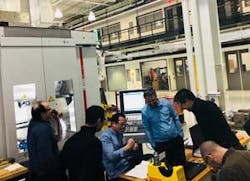Siemens and startup Bonsai create autotuning CNC machine using AI
The Commonwealth Center for Advanced Manufacturing (CCAM) team in Virginia.
AI startup Bonsai and Siemens have deployed AI on a real-world machine in a test environment that marks the first time deep reinforcement learning has been successfully applied to auto-calibrate real-world Computer Numerical Control (CNC) machines. Siemens experts trained an AI model, using Bonsai’s AI Platform, to auto-calibrate a CNC machine more than 30 times faster than an expert human operator based on estimation performed by Commonwealth Center for Advanced Manufacturing (CCAM) in Virginia.According to Bonsai, the value that CNC machines provide global manufacturers is constrained by high maintenance costs and to achieve the highest possible quality of production, CNC machines need to be recalibrated frequently, as even minor friction leads to errors that result in costly manufacturing imperfections. Usually, manufacturers will have to bring specialists, which can take hours. That downtime wastes time and money for many manufactyurers.
Siemens partnered with Bonsai, which created an AI platform based on deep reinforcement learning. The platform is based around what Bonsai calls ‘Machine Teaching’ technique, which enables subject matter experts such as specialist engineers to train machines to efficiently perform complex task. Using a simple scripting language, experts can design the lessons and rewards required to train each task. Bonsai’s AI Engine supports a range of deep reinforcement learning algorithms, along with the logic for choosing the best-fit algorithms and guiding the training. In this way, the experts are able to leverage AI without themselves having to gain a deep understanding of machine learning.
To build this proof of concept, the team used Bonsai’s AI engine to build a predictive model that would calibrate the CNC machine. Each model produced by Bonsai is referred to as a BRAIN (Basic Recurrent Artificial Intelligence Network). The AI engine trains each BRAIN using deep reinforcement learning algorithms. After six months of PoC, CCAM tested a BRAINs’ ability to calibrate a Siemens CNC controlled machine. The most successful BRAINs calibrated a CNC machine more than 30 times faster than the human operators, while achieving precision of less than two microns.
Mark Hammond, Bonsai CEO
"The results we achieved using Bonsai demonstrate that organizations can deploy the latest AI technologies in a noisy real-world system," said Michal Skubacz, Siemens vice president and head of industry software at Siemens Motion Control. "The solution possible based on the proof-of-concept with Bonsai could augment and scale the work of our best operators. Instead of having operators carry out the same work repeatedly, they can focus on training the machines to perform better and more advanced tasks.""Our successful project with Siemens represents a huge milestone in industrial AI, demonstrating the powerful results that can be achieved by combining machine teaching and machine learning," said Mark Hammond, CEO and co-founder of Bonsai. "The beauty of this approach is that it balances the best of human and machine intelligence. Applied across the whole industrial manufacturing sector, the implications are staggering."
Read the Siemens case study.



